DHAKA, Oct. 27 -- Anxieties mounted across Bangladesh over deadly political violence which has left 12 people dead and hundreds injured since Friday.
The fresh wave of violence broke out Friday after former Prime Minister Khaleda Zia's 18-party opposition alliance had earlier said that Oct. 25 was the last day of Prime Minister Sheikh Hasina 's government and asked supporters to take to the street on the very day to press home its demand for the restoration of the non- party caretaker government system.
Khaleda on Friday called a three-day nationwide shutdown from 6 a.m. local time on Oct. 27 to 6 p.m. on Oct. 29 to press for the restoration of non-party caretaker government to oversee next general elections in early 2014.
Five men were reportedly dead and scores including cops injured in violence in the first day of Khaleda's Bangladesh Nationalist Party (BNP)-led opposition alliance enforced strike on Sunday.
Six protesters were also reportedly killed and 500 others injured when opposition supporters and their ruling party rivals fought pitched battles across the country on Friday.
The death of another opposition man was reported Saturday.
The official death toll was not available in the fresh wave of violence.
The usually busy streets of the capital Dhaka looked almost deserted on Sunday night as panic gripped the city residents and thousands of anti-riot police were deployed.
Hasina's Awami League (AL) party blamed the main opposition party for creating anarchic situation in the name of political activities and urged opposition leader to withdraw hartal call and sit for dialogue.
On account of the hartal, dozens of vehicles were smashed or set on fire in Dhaka and elsewhere Sunday.
The traffic in Dhaka remained relatively thin as most private vehicles were kept indoors.
Local television footage showed security forces dispersed protesters with tear gas and rubber bullets as they tried to march on major roads in Dhaka.
Clashes between pro-hartal pickets and police backed by ruling party activists have been reported in Dhaka and elsewhere.
The two strong women held phone talks on Saturday, the first direct conversation between them since Hasina cabinet took office in January 2009.
Hasina invited Khaleda Zia to her official residence on Monday evening to break the deadlock over the form of the government ahead of the elections.
Zia accepted Hasina's invitation for dialogue but deferred the premier's proposed date.
BNP had earlier rejected Hasina's all-party interim government proposal.
Since Bangladesh parliament abolished the non-party caretaker government system in June 2011 after an apex court verdict declared the 15-year-old constitutional provision illegal, the BNP- led alliance has been pushing for the reinstatement of the provision.
The scrapped provision mandated an elected government to transfer power to an unelected non-partisan caretaker administration to oversee parliamentary elections.
The opposition has asked Hasina to bring back the caretaker system, or else it won't participate in the next polls because it fears an election without the caretaker government will not be free and fair.
The parliament is due to expire on Jan. 24 next year and elections should be held within 90 days before its expiry.
"You will be responsible for all the consequences if you don't start dialogue to reach consensus about the polls-time government. Your (Hasina's) government will be illegal from Oct. 27," Khaleda said Friday.
But AL claimed that Hasina's government would remain in office till Jan. 24 as per the constitution
In Bangladesh, which has seen frequent electoral fraud and violence, the caretaker government held elections in 1996, 2001 and 2008, which were recognized as free and fair by local and international observers.
Bangladesh plunged into a major political crisis in late 2006 and returned to democracy after two years of army-backed rule following a widely accepted parliamentary elections in 2008.
America Sunday urged the major parties in Bangladesh to engage in constructive dialogue to find an agreed way forward to hold free, fair and credible elections.
U.S. Ambassador to Bangladesh Dan W Mozena said in a statement he is encouraged by developments, including most recently the telephone conversation between Prime Minister Hasina and Zia, and hopes these positive developments will culminate soon in a constructive dialogue between the major parties on the best way forward for achieving free, fair and credible elections.
America's message to all political players is that violence is not a part of the democratic process and is not acceptable, said the statement.
"While engaging in peaceful protest is a fundamental democratic right, we firmly believe that violence is never the answer. We are concerned by the violence and deaths that have occurred. We look to the Government of Bangladesh to ensure the safety of all its citizens and encourage all Bangladeshis to peacefully express their views. We call on all parties to ensure that they use peaceful means to pursue their objectives."
Japan, meanwhiel, expressed deep concern about the continuing escalation of violence and hostility in Bangladesh.
"Japan, as a long-time friend and important stakeholder of Bangladesh, while condemning any kind of violence and destructive activities, urges the restraint of both ruling and opposition parties so as not to cause any loss on its citizen's safety and welfare over the path of resolving the political confrontation," Ambassador of Japan Shiro Sadoshima said in a statement.
China had earlier called for dialogue between the ruling and opposition parties.
Chinese Ambassador to Bangladesh Li Jun told a press briefing at the end of August that Bangladesh's ruling and opposition parties should resolve the current political stalemate through dialogues.
"As a near neighbor and friendly country, China is very concerned about Bangladesh's political situation. We hope Bangladesh could keep peace and stability," he said.
"Awami League and BNP have many common grounds. Both of them hope the next national election will be participated by all political parties in a transparent, free and fair manner." Li said. "Their only bone of contention is how to hold the election."
"If the two parties can hold face-to-face dialogue, it will be beneficial to all stakeholders. They should express goodwill, instead of aggressive words and deeds, to each other."
The ambassador said that the final resolution depends on Bangladeshi people. "I believe Bangladeshi politicians have enough wisdom to resolve the political deadlock," Li said.
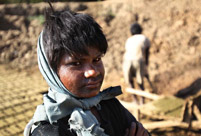 Low wages Indian migrant laborers
Low wages Indian migrant laborers Five fighters in flight training
Five fighters in flight training London mayor hails free trade, subway system on China tour
London mayor hails free trade, subway system on China tour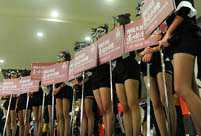 Different eye catching shows at housing fairs in China
Different eye catching shows at housing fairs in China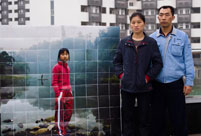 Special family portraits call attention to left-behind children
Special family portraits call attention to left-behind children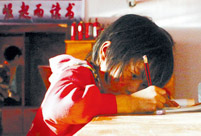 Migrant children’s pain and joy in city
Migrant children’s pain and joy in city Lingerie show dazzles Wuhan Motor Show 2013
Lingerie show dazzles Wuhan Motor Show 2013 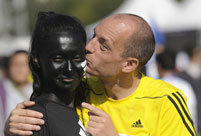 Running in fun customs at Beijing Int'l Marathon
Running in fun customs at Beijing Int'l Marathon  Weekly Sports Photos
Weekly Sports Photos Chinese riot police take Liberia peacekeeping mission
Chinese riot police take Liberia peacekeeping mission World has never been dark-- a blind kid’s life in Tibet
World has never been dark-- a blind kid’s life in Tibet Oriental education or western education?
Oriental education or western education? China in autumn: Kingdom of red and golden
China in autumn: Kingdom of red and golden U.S. Senate leader announces bipartisan deal
U.S. Senate leader announces bipartisan deal Chinese screen goddesses from Beijing Film Academy
Chinese screen goddesses from Beijing Film Academy Day|Week|Month